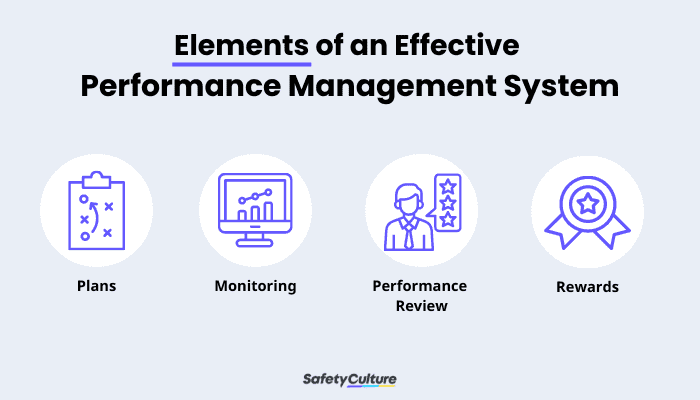Performance Management System
Discover what a performance management system is, the types of performance management systems, and how to effectively implement a performance management system in your organization.

Published 13 Dec 2023
Article by
5 min read
What is a Performance Management System?
A performance management system encompasses the processes that an organization takes to facilitate effective and clear communication between the supervisors and employees. Performance management is complicated, and a performance management system is necessary to make sure organizations are on the right track when it comes to ensuring that all systems are running smoothly and the company’s goals are being met.
A performance management system is in place year-round to assist everyone in the organization, aligning goals and setting both individual and team goals, while also developing employees to ensure they meet and exceed goals regularly.
Defining Performance Management
Performance management is a complex process. Simply put, performance management refers to the ways an organization communicates with the teams and individual employees to ensure that everyone is on the right track and performing as expected. It’s easy to assume that performance management only consists of a performance review every year. However, this is a constant process where managers, supervisors, and employees need to work together to achieve peak productivity and find ways to further improve the different processes.
Purpose of a Performance Management System
Performance management can be very tough in both large and small organizations. This is why a comprehensive management system is necessary to aid every member of the organization in aligning goals and consistently improving performance. Without it, it can be easy for people to lose track of the main goals of the company, which can result in a drop in numbers.
Types
There are many types of performance management systems that are geared toward different companies and industries. However, most of them can be divided into two categories: organizational and personnel performance management systems.
Organizational Performance Management Systems
As the name suggests, organizational performance management systems apply to the whole organization. These are macro systems that have a much wider reach. They are used to help define the methodologies that organizations will use to define their goals, measure them, and ultimately attain them.
There are more than a few types of organizations’ performance management systems. But some of the most common ones include:
Balanced Scorecards – Combines financial, customer, internal processes, and personnel perspectives to give a comprehensive view of goals and how to achieve them.
Management by Objectives – Groups goals into larger sets that you can look at from a wider perspective.
Budget Driven Plans – A system that’s largely based on the organization’s budget and revolves around it.
Personnel Performance Management Systems
These are also called HR performance management systems and are used to create a framework that the team uses when evaluating employees and their performance. These are also used to appraise and align employee performance with the organization’s overall goals to make sure everyone is united in achieving the company’s larger objectives.
Why a Performance Management System is Important
Modern businesses exist in a fast-paced industry that’s complex and tough to understand. Performance management systems are in place to simplify the organization’s large and small goals and can outline the ways they can reach their goals.
Performance management systems don’t just look at input and output. They also consider everything that goes in between that including innovation, adaptability, and communication, which are key aspects in achieving the larger goals of the business.
A 2018 study showed that over 75% of businesses made changes to their performance management systems. This shows that performance management systems are top priorities for many businesses, especially if they want to compete in the modern world.
A high-quality performance management system paves the way for innovation, enhanced productivity, and an upward trajectory for a business. And in this fast-paced business landscape, we live in, it’s important for businesses to have clear systems in place for managing and improving performance.
Digitize the way you Work
Empower your team with SafetyCulture to perform checks, train staff, report issues, and automate tasks with our digital platform.
Elements of an Effective Performance Management System
Every organization has the freedom to create a performance management system that suits its specific needs. All businesses have unique needs, goals, and methodologies that need to be considered when creating a performance management system.
But while systems may vary greatly from organization to organization, there are some elements that remain constant. These include:

Plans
An effective performance management system needs to include concrete plans that an organization needs to follow to meet its overall goals. When crafting a performance management system, it’s important to leave room for the planning phase which includes aligning and setting goals for the company.
Monitoring
Performance management systems need to be able to monitor both employee and team performance. This is to ensure that everything is going to plan and the company’s goals always remain within reach.
Performance Review
It’s important not to skip over performance review when creating a performance management system. Performance review allows you to see where certain employees are falling short and where they are exceeding. From there, it will be much easier to create a concrete plan to increase productivity and improve performance.
Rewards
To properly manage performance within an organization, employees need to be incentivized to achieve goals. So, make sure to have rewards in place that will show employees that their hard work matters and will pay off.
Using SafetyCulture (formerly iAuditor) to Implement a Performance Management System
What is SafetyCulture?
Creating an effective performance management system on its own is a complicated task. But even with a high-quality performance management system, all the effort would be for nothing without proper implementation. This is why tools like SafetyCulture offer a great solution for companies having a tough time implementing their performance management system.
SafetyCulture, as a performance management software, is a comprehensive tool that can streamline processes and help organizations make sure their performance management system is running effectively. This is an all-in-one app that you can use not just for implementing a performance management system but improving overall performance in the company.
Some of SafetyCulture’s key features that aid in implementing a performance management system include:
Automated monitoring with the use of tools to make sure all equipment is running smoothly and employees don’t encounter unnecessary problems
Give employees a proper reporting system that allows everyone to know about issues as soon as they are discovered
Assign tasks to employees and teams to make sure everyone understands what they are supposed to do and how they are supposed to do it
Build workflows to make it easier to align teams under a singular goal
Heads Up to allow workers to easily communicate with each other and remain on the same page
Related articles
Operations
Business Processes

Understanding the Importance of Process Automation Reliability
Learn how reliable process automation is key to safe, consistent operations and how it minimizes quality and compliance risks.
Logistics
Operations

Transportation and Logistics: What’s the Difference?
Learn about the importance of transport and logistics within the supply chain and how it is used in business operations.
Logistics
Operations

An Overview of Transport Network Analysis
Learn about transport network analysis and how network-level insight improves reliability and reduces operational risk.